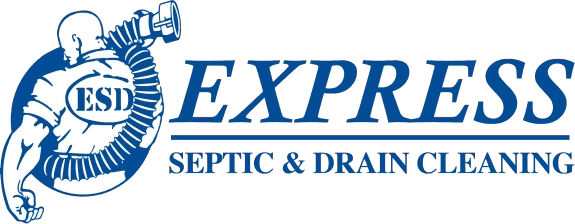No homeowner wants to deal with a septic tank collapse, which can cause major headaches, costly repairs, and even serious health risks. Knowing the warning signs of septic tank collapse, like soggy patches covering your yard and gurgling noises in your drains, helps you catch the problem before your tank fails completely.
Read on to learn the top causes and symptoms of septic tank failure and when to call Express Septic for a professional inspection.
Why Septic Tank Collapse Is a Serious Issue
Septic tank collapse is more than a costly inconvenience. If your system breaks and sends sewage streaming throughout your property, it puts your health, home, and the environment at risk.
The hidden dangers of a collapsing septic system
If your septic system collapses, you could face serious hazards, including:
- Sinkholes and ground instability: When your septic tank collapses, the soil can cave in and create a dangerous sinkhole that can put your household at risk.
- Contaminated groundwater: Broken septic tanks leak untreated sewage into your property, potentially contaminating the water you use for drinking and irrigation.
- Risk of exposure to raw sewage: If sewage enters your drinking water, it can expose you to harmful pathogens and bacteria that threaten your health.
- Structural damage to your foundation: Septic tank collapse often causes ground instability, damaging your home’s foundation and leading to costly repairs.
Why it happens
Septic tank collapse is often the result of wear, improper maintenance, or hidden damage. Some of the most common causes include:
- Aging or improper maintenance: Without regular treatment and pumping, your tank deteriorates faster and is more prone to early failure.
- Heavy equipment or traffic over the tank: Excessive weight over your septic tank can cause cracks or breaks that lead to collapse.
- Soil saturation: Rain or improper drainage can waterlog the soil, making the ground above or below your tank unstable.
- Corrosion, cracks, or pressure imbalances: Without repair, damage and internal pressure weaken your tank’s walls and lid, eventually leading to failure.
Common Signs Your Septic Tank May Be Failing
Knowing the signs your septic tank is failing can help you catch the problem early and avoid the consequences of a complete collapse.
In your yard
Your septic tank is often buried underground, so it’s not uncommon for the following warning signs to show up outside your home:
- Soggy patches or standing water near the tank.
- Sinkholes, indentations, or caved-in soil above or near the tank.
- Foul, sewage-smelling odors around the septic area.
- An influx of bugs and pests near the septic area.
- Lush, green grass growing over the drain field.
In your home
While your septic tank is outdoors, signs of failure can also travel inside, including:
- Gurgling sounds in drains or toilets.
- Slow-draining sinks, tubs, or toilets.
- Frequent clogs or sewer smells inside your home.
- Unexplained wet spots in your basement or crawl space.
- Plumbing backups after periods of heavy rainfall.
What To Do If You Notice These Signs
If you notice any of the above warning signs, you must act quickly to prevent costly damage. Immediately stop using water and appliances that drain into your septic system, and avoid walking over the affected area. Next, contact a licensed septic system specialist for an emergency inspection.
Depending on your setup, they’ll perform a video camera inspection or soil test to assess the extent of damage. If your septic system is nearing collapse, they’ll immediately schedule a replacement to protect your home and property.
How Express Plumbing Can Help
At Express Septic, we’re on call and ready to help when your septic tank starts showing signs of trouble. We offer same-day inspections and five-star assessments that detect septic tank structural issues and catch potential failures early.
Our experts use non-invasive inspection and septic repair methods to locate damage and fix your system without disrupting your property. With help from our team, you’ll protect your family, home, and property from disastrous septic collapse.
Catch Septic Problems Early with Express Septic
Never ignore the signs of septic tank problems. Contact our team to schedule a professional septic inspection at the first sign of trouble. We’ll assess your system, identify the risks, and offer transparent repair and replacement options. Whether a simple fix or complete system replacement, acting fast helps prevent further damage and keeps your family safe.
Call us or book online to schedule your septic service today! We proudly serve Nampa and the surrounding areas with comprehensive plumbing solutions.
Frequently Asked Questions
What does a collapsed septic tank look like?
Your septic tank is buried underground, so you often won’t be able to see the tank itself when it collapses. However, you’ll likely spot some signs above where the tank sits, like caved-in areas, soggy patches, and sewage surfacing, indicating collapse.
What should I do if my septic tank lid looks like it’s sinking?
If your septic tank lid appears to be sinking, immediately call our team for inspection. A sinking lid is often a sign of structural damage or soil erosion, which can lead to collapse. We’ll quickly assess your tank and recommend repair or replacement to protect your property from further damage.
How often should I have my septic tank inspected to prevent collapse?
We recommend scheduling a professional septic tank inspection at least once every two to three years. Routine inspections catch early signs of wear, damage, or blockages before they become serious problems. It’s also important to schedule pumping every three to five years, before your septic tank shows signs that it’s full, to keep it functioning correctly.
Is it dangerous to walk over or drive over a septic tank?
Walking or driving over your septic area poses a threat to your safety and the condition of your tank. The ground above may not be stable, leading to a risk of collapse and dangerous sinkholes. Excess pressure can also cause cracks or breaks in the tank, leading to costly repairs and potential collapse.



